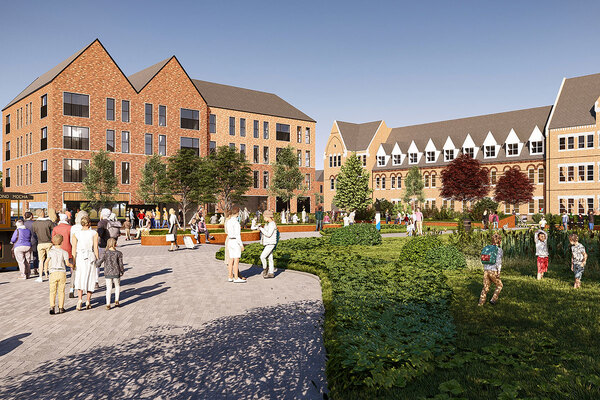You are viewing 1 of your 1 free articles
 Jules Birch
Jules BirchTime for parties to work together on housing
As Theresa May calls for ideas from other parties on the gig economy, Jules Birch asks, what about a similar approach for housing?
 Jules Birch
Jules BirchIf we need to ‘invest in good work’, what about good homes?
Theresa May was speaking at the launch of the Taylor review of the gig economy on Tuesday exactly a year after she became prime minister.
In the wake of her failed election gamble, she needs non-Tory support to address the challenges identified in the report.
And her plea to the other parties to “come forward with your own views and ideas about how we can tackle these challenges as a country” is being interpreted as being about more than just the labour market.
So if the challenge of precarious work requires cross-party co-operation, what about that of precarious housing?
On the surface, the chances of Theresa May adopting Labour or Liberal Democrat ideas look about as likely as those of Jeremy Corbyn announcing that he will work with the Tories on housing or anything else.
But unless there is another general election soon (still a possibility) she will need some opposition support to implement the reforms identified in the Taylor review.
And any measures to tackle the housing challenge that go beyond the status quo represented in the White Paper will also require the support of other parties.
Beneath the headlines and political point-scoring, housing ought to be one area where the parties can work together.
One positive is that the Conservatives under May seem to have moved away from the divisive policies of the Cameron-Osborne years: pouring everything into homeownership schemes to boost the Tory vote while doing all they can to undermine social housing on the grounds that it breeds Labour voters.
“Housing ought to be one area where the parties can work together.”
Equally, Labour’s manifesto – and especially its more detailed mini-manifesto published in the final days of the campaign – were serious attempts to grapple with the issues facing housing across all tenures.
There were also examples in the last parliament of the parties working together.
The all-party Work and Pensions Committee and the Communities and Local Government Committee jointly recommended that the government should change its plans to link funding for supported housing to the Local Housing Allowance.
The committees offer an obvious opportunity for cross-party working in the new parliament in the absence of co-operation at the top.
And the Homelessness Reduction Act was proposed by Conservative MP Bob Blackman but passed with all-party support for its new approach to homelessness prevention.
If this parliament continues for its full term, informal co-operation like that will be desperately needed, not least to ensure that the rest of the housing system does not carry on creating homelessness quicker than the new legislation can prevent it.
To set the right tone, the Conservatives could formally drop their divisive 2015 manifesto commitment to force councils to sell their high-value stock as it falls vacant to fund the extension of the Right to Buy to housing association tenants.
Forced sales are on the statute book and awaiting implementation but no workable version of the scheme has emerged since it was first written on the back of an envelope at Policy Exchange.
“Rather than quietly forget about the high-value asset levy, why not formally abandon the idea?”
The pledge has little support in Tory local government and it didn’t appear in the 2017 manifesto.
Rather than quietly forget about it, why not formally abandon the idea: let central government and the housing associations who want it fund Right to Buy discounts if they want to.
Next, opposition MPs could acknowledge that the 2017 Tory manifesto did have some good ideas.
The pledge to halve and then end rough sleeping deserves all-party support. So too, perhaps, the rather misleading “new generation of council housing” if it were adapted to include social as well as affordable homes.
Reform of compulsory purchase and encouragement for land value capture also looked promising but they are in danger of disappearing along with Nick Timothy and the Tory majority.
Borrowing from Labour, the government could still implement its plan for a Department of Housing with a dedicated cabinet minister.
This would give housing more clout within government and send a clear signal about the political importance of the response to Grenfell Tower.
From the Lib Dems, Ms May could look at ideas for a Housing and Infrastructure Development Bank and lifting local authority borrowing caps.
England has already borrowed some of Wales’ approach to homelessness and Scotland’s ban on letting agent fees so maybe now it’s time to look at Scotland’s ambitious targets for affordable (including social) housing too?
“The differences between the parties are much clearer on housing benefit and social security.”
The Green Party’s approach to the private rented sector – rent control and secure tenancies – may be anathema to the Conservatives now and may never happen in full, but politics is moving inexorably in the direction of greater regulation.
Who would have thought even two years ago that the Tories would be proposing a fees ban?
The differences between the parties are much clearer on housing benefit and social security.
Despite having no majority, cuts and freezes introduced in the last parliament will have an effect right up to 2020. If austerity is over, try telling that to the people who will be tipped into destitution and homelessness.
As an illustration of the effects on housing benefit and people on low incomes, see analysis by Abi Davies and Chris Buckle launched today.
Beyond that cross-party consensus on funding supported housing, the parties look miles apart on housing benefit. The government is still poised to appeal against its defeat on the overall benefit cap.
So the government could again borrow from Labour and adopt its approach to reducing the deficit. Make clear the difference between investment and day-to-day spending and bricks and benefits and appreciate that investing in homes for social rent now means a lower housing benefit bill later.
A similar point was made by former Conservative MP Nick de Bois in a Conservative Home article arguing for “a bold offer on housing”:
- “We have been far from radical on this front, and continue to prop up the rental market with £25bn a year of taxpayer-funded housing benefit. This state of affairs is begging for a fresh approach. But to date this has wrongly been considered as un-Conservative, resulting in the huge housing benefit bill and limited policy tinkering to encourage private developers to supply new homes.”
He argues that instead:
- “Provision of social housing is a means to unlocking the supply side shortage of housing. It is in fact inherently Conservative to increase spending on building social housing rather than continue to spend over £25bn a year on housing benefit, which simply subsidises the private rented sector. The latter should eventually be phased out as we benefit from investment in tackling the root cause of limited housing stock and absurdly high rents.”
However, if a growing number of Tories accept that housing was a key reason they did so badly among younger voters, there is no agreement on the diagnosis of the housing problem, let alone the treatment.
In The Times on Tuesday, Conservative MP Charlie Elphicke characterised the problem like this: “A decade on from the credit crunch, young people have too much personal debt and struggle to get on to the housing ladder. Meanwhile the wealthy are encouraged to invest in buy-to-let properties rather than job-creating business and infrastructure.”
But he appears to see housing entirely through the prism of homeownership: “Steps taken through the government’s Help to Buy schemes have helped. But it is not enough. We don’t need less help for young people, we need more: help to access finance and level the regulatory playing field so that people buying a second home for renting don’t get a better deal than those trying to get their first foot on the housing ladder.”
That argument seems to take us right back to the worst days of George Osborne while completely failing to recognise that a gig economy that works for the former chancellor leaves most people struggling to pay their rent, let alone get on the housing ladder.
Good work requires good homes – and vice versa.
Jules Birch, award-winning blogger
Related stories









